Misguided (Part 1)
On Dr. Castro and the Miami-Dade Commission on Ethics' ill-advised guidance.
Last month, the Miami-Dade Commission on Ethics (COE) issued a revised draft advisory opinion as part of Dr. Castro’s ongoing ethics inquiry. As some will remember, I covered this story last October, shortly after the COE issued a preliminary opinion advising Dr. Castro that she would likely violate ethics rules if her business continued to expedite permits in Coral Gables while serving as city commissioner. Much of the two-page revised opinion is mere background, while the operative section consists of the following three paragraphs (emphasis mine):
The Ethics Commission declined to opine on any specific transactions that you or your employees may be engaged in, instead choosing to provide broader cautionary guidance.
In interpreting Section 2-11.1(m)(1) of the Miami-Dade Code, the Commission opined that an official and his or her private company employees may represent clients engaging with the official’s city, as long as the contacts or representation are limited to ministerial matters or simple informational requests. If the contacts or representation involve advocacy on the part of the official or the employees and requires responsive decision-making or discretionary action by a city official, board member, or employee, then a prohibited conflict of interest may be found.
Consequently, you and your employees should refrain from any contacts or representational activities on behalf of clients engaging with your city if these involve advocacy on your part or that of your employees and any responsive discretionary action by a city official, board member or employee.
Ostensibly, the revised opinion is more forgiving than its predecessor, leading some to characterize it as a “walk-back,” others as an “about-face.” Dr. Castro saw it as “vindication” (the COE should view this as a danger signal).
I, however, would simply describe it as misguided, both as a matter of reason and of law. In this post, I will focus on dissecting the most glaring flaws in the reasoning behind the revised opinion, reserving the analysis of its more concrete shortcomings for part two.
A sticky situation
The conceptual flaw in the COE’s “broad cautionary guidance” is that it assumes the various functions of Dr. Castro’s permit-expediting business can be neatly divided and segregated into two buckets, which for simplicity’s sake I will refer to as the ministerial and non-ministerial buckets. The non-ministerial bucket consists of what one would refer to as “lobbying” in common parlance: contacts with government employees that involve advocacy on the part of the expediter and discretionary action on the part of the city employee. The ministerial bucket captures everything else, including simple informational requests.
This particular taxonomy is not novel—it is derived from existing code and prior COE rulings. Nor is it nonsensical. An attorney filing a routine document with a clerk represents a purely ministerial task, while an attorney arguing before a judge is a clear example of non-ministerial activity. The ministerial and non-ministerial nature of each is easily recognizable. The distinction works.
But what if an attorney files a document with a clerk and requests expedited processing as a favor? What if that attorney’s boss also happens to be the clerk’s boss? Into which bucket do these interactions fall? Indeed, this is where things get sticky.
Then again, why work with hypotheticals when we have real and more relevant examples at our disposal? A recent public records request for all emails exchanged between Dr. Castro’s employees and the city’s development services department since Dr. Castro was elected yielded just under 3,000 records (you can find all the records linked in two documents at the bottom of this post). That is 3,000 over the course of only one year. That alone should serve as a bright red flag for anyone who thinks permit expediting is merely glorified paper shuffling. At any rate, here is one of the emails:
That seems like a fairly benign informational request, does it not? It certainly looks to be purely ministerial based on content alone. But what about this one?
Or these?
“Ask for your assistance in request [sic] an early start.” “It would be a great help.” “The owner is facing multiple hardships due to the delay.” “May the riches of Solomon be bestowed upon your remarkable service to this city.”
That last one—that little wink-wink—is my favorite. It sounds like one of those code phrases the CIA or the mafia uses, like “The swallow flies at midnight.” Anyway, is any of this beginning to sound like advocacy yet? Might these expediters be requesting responsive discretionary action from building officials? If you are not sure, perhaps ask yourself if when you submit an online form to renew your driver’s license (a purely ministerial task), are you able to sweet-talk the computer and tell it how it would be such “a great help” if it could put a rush on your renewal? And what to make of an email like the following, one of a great many just like it in the aforementioned batch of records?
“Our client is in a desperate situation and needs to discuss this matter urgently. Can we please schedule a meeting at your earliest convenience?”
How many of these urgent meetings, dear reader, do you imagine take place off the record?
Nonetheless, if this still is not sticky enough for you, just consider the context: virtually everyone included in those emails works under Dr. Castro in one form or another. Therefore, to be realistic about this, we should imagine an implied heading at the top of every M.E.D. email that reads: On behalf of our mutual boss, Commissioner Castro.
Mind you, this implication is made infinitely stronger by one small, yet powerful, detail: the M.E.D. email address. Note how rather than use a unique employee address, each expediter uses the same generic address: permits@medexpeditors.com. They are relying on what is called a “shared mailbox,” which allows multiple members of an organization to send and receive emails from the same address. More importantly, it enables users—like supervisors and employers—to be included in email chains without being copied or blind copied, thus allowing for what is effectively a hidden presence. Does Dr. Castro have access to that shared mailbox? Of course. Does every building official know that? You bet!
And lest you are inclined to believe that this entire cast of characters is too principled to play reindeer games, or that they lack the requisite guile, take a close look at the following email sent from a development services employee to the department director, Douglas Ramirez, regarding her work duties. Notice who she blind copied:
But remember, Dr. Castro has no influence over building officials. She does not involve herself in any intradepartmental affairs. Therefore, there must be an innocent explanation as to why a building official would blind-copy the good doctor on any email, much less on that one. Perhaps the employee mistook that email for an herbal tea recipe—the kind of thing we all covertly share with our bosses from time to time? Oh, and trust me, there is absolutely no subliminal messaging encoded in the following images, courtesy of Doctor Castro’s marketing material:
Overbroad cautionary guidance
Imagine a friend is hosting a party and is requiring that all her guests wear black. She is very serious about this. You really want to attend this party and think you have found the perfect dress at the department store, but you are not quite sure whether the dress is actually black or navy blue. So you snap a photo of that dress and send it to the host to determine whether the dress is black, to which she replies: “I decline to opine on the color of any specific article of clothing and will instead offer the following guidance: black is the very darkest color owing to the absence of or complete absorption of light. Please refrain from wearing anything that is not black as you may be denied admission to my party.”
Would you say the host offered reliable guidance? Would you even bother attending the party? Probably not.
Hence the issue with the COE’s revised opinion. It avoids the pertinent, if implicit, question at the heart of Dr. Castro’s inquiry. That question is not whether Dr. Castro’s company can advocate on behalf of clients or request responsive discretionary action (of course it cannot). It is whether her company is doing any of that.
To use another analogy, simply explaining what pass interference is in the NFL is exceedingly easy. The definition is right there in the rulebook. But determining if a specific act constitutes pass interference? That is an entirely different animal. It is a question that has been at the center of some of the greatest controversies in professional sports, and it is why referees make the big bucks. The COE is essentially the referee of public-sector ethics. Making difficult ethical determinations is its fundamental duty. To delegate that duty to anyone—much less a novice politician whose judgement is so awful she thinks glancing at a potential city manager’s LinkedIn page for all of 15 seconds qualifies as due diligence—by way of vague and subjective guidance would be, dare I say it, unethical. Was the COE required to perform a transaction-specific analysis or consider countless hypothetical scenarios? No. But was it obliged to offer useful guidance? Yes. And as evidenced by its original opinion, it could have done that by analyzing permit expediting holistically.
Nevertheless, rather than confront the central question head-on, the COE’s revised opinion retreats behind “broad cautionary guidance” that is borderline tautological. It asks Dr. Castro to navigate an expansive ethical minefield with guidance that is tantamount to a map hastily drawn on the back of a wet napkin. I am no fan of Dr. Castro, obviously, but even she deserves better.
And do better the COE certainly should. It should embrace reality and acknowledge that permit expediting is one continuous, complex, and systemic bureaucratic interface, and that attempting to extract purely ministerial functions from it is like trying to extract the yolk from a scrambled egg.
It should concede that the non-ministerial dimensions of permit expediting irrevocably multiply and compound when it is conducted by a business that is owned and operated by a sitting commissioner, at which point the question becomes not “Is this advocacy?” but rather, “Is this extortion?”
It should acknowledge that even if none of this were correct a priori, it is nonetheless true when one looks at the behavior of M.E.D expediters and its owner.
Finally, it should realize that no one under its jurisdiction should have to intuit the precise location of their own ethical boundaries, that the erasure of the bright line it established in its original opinion is not forgiving but potentially entrapping, and that as a matter of reason alone, it would be reckless to allow Dr. Castro to continue expediting permits in the very city she serves.
I’ll be back with part two tomorrow…


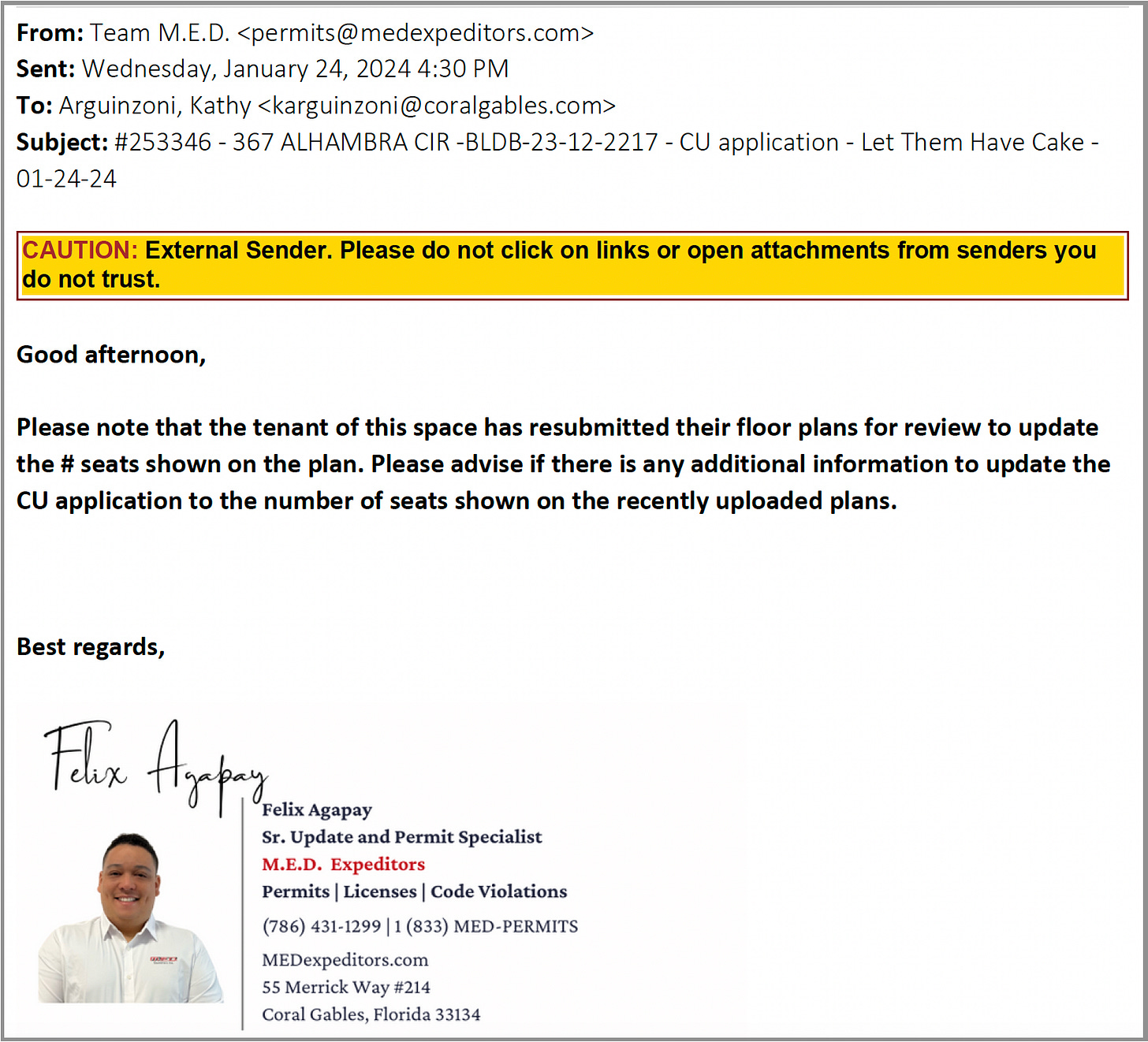
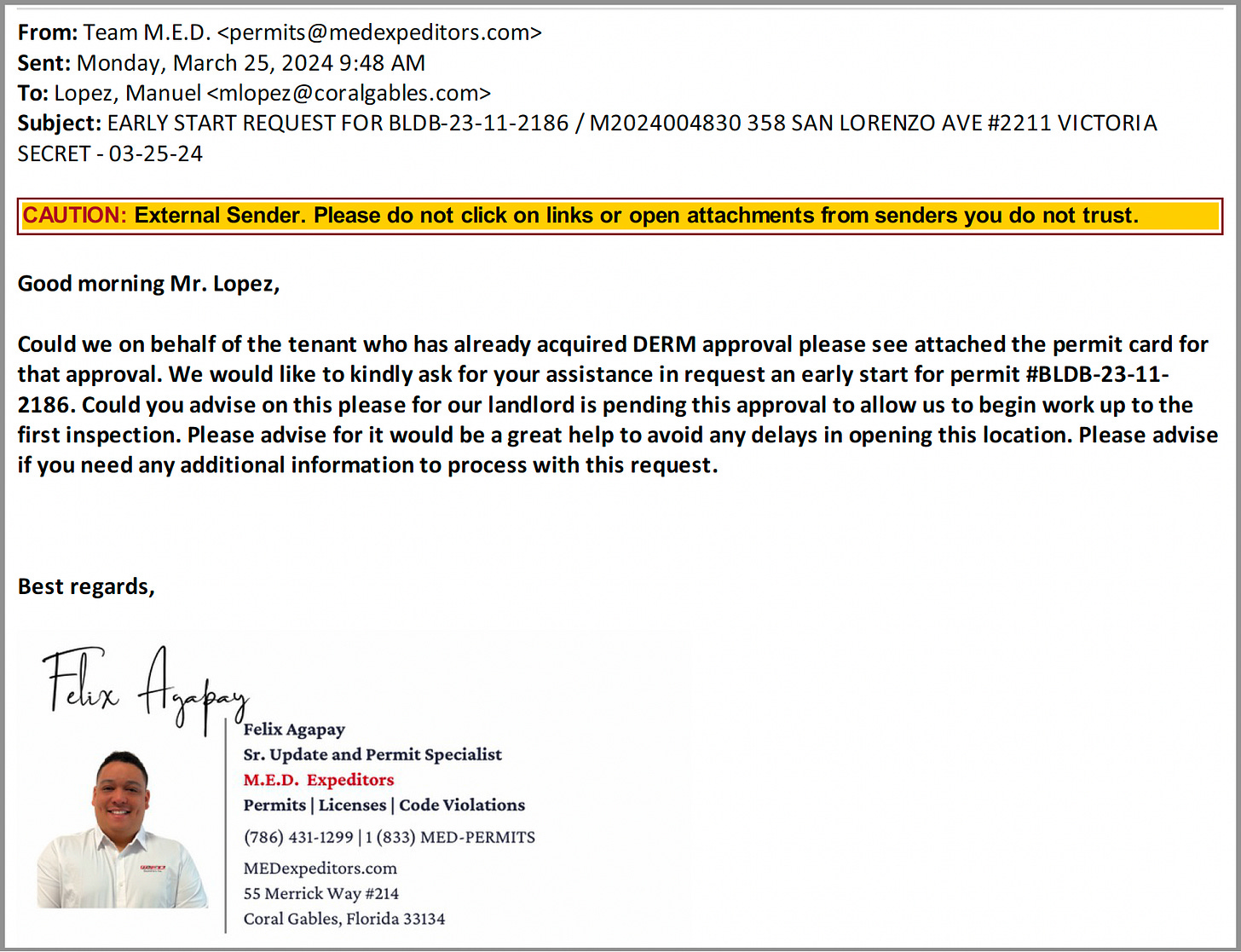
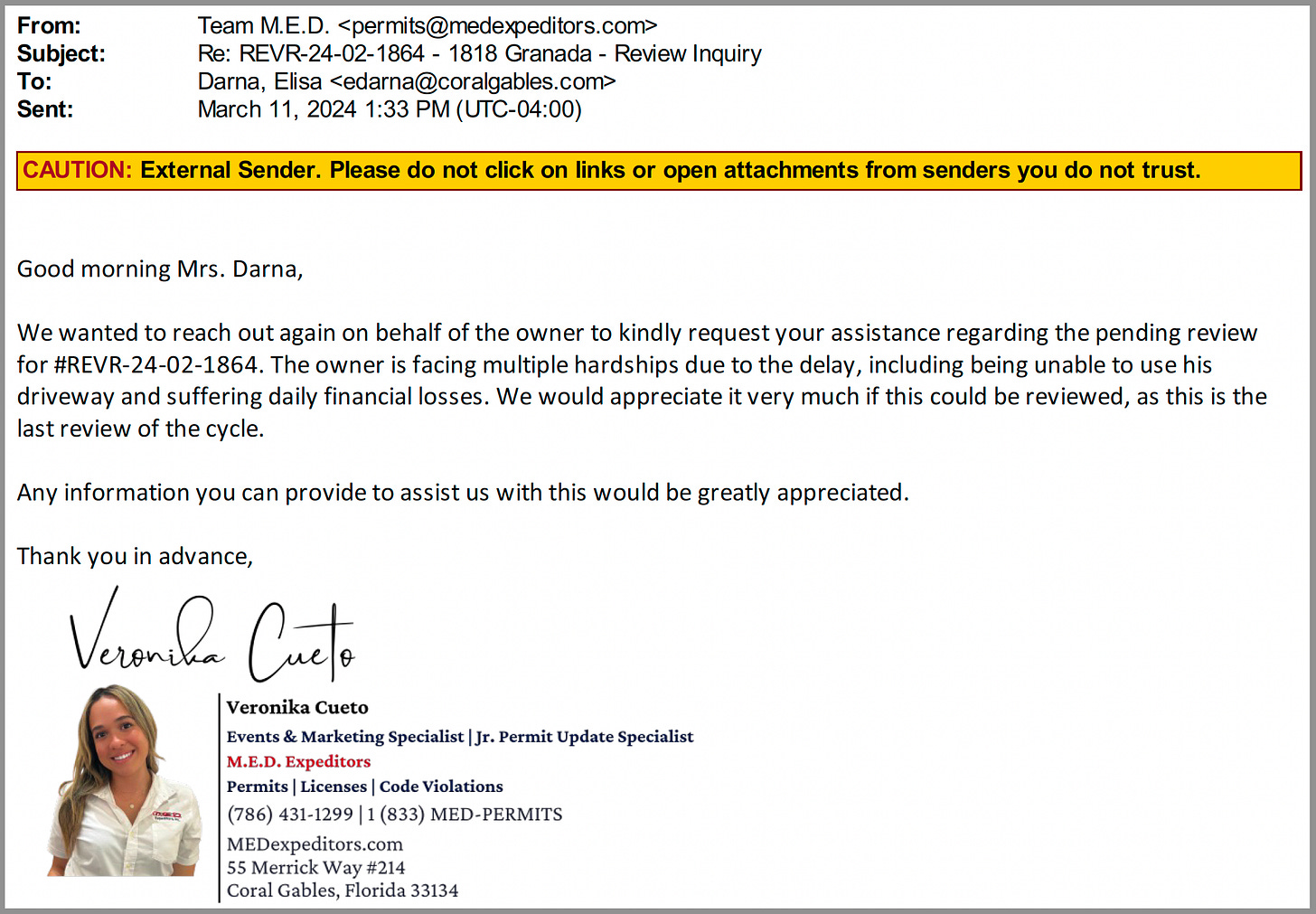
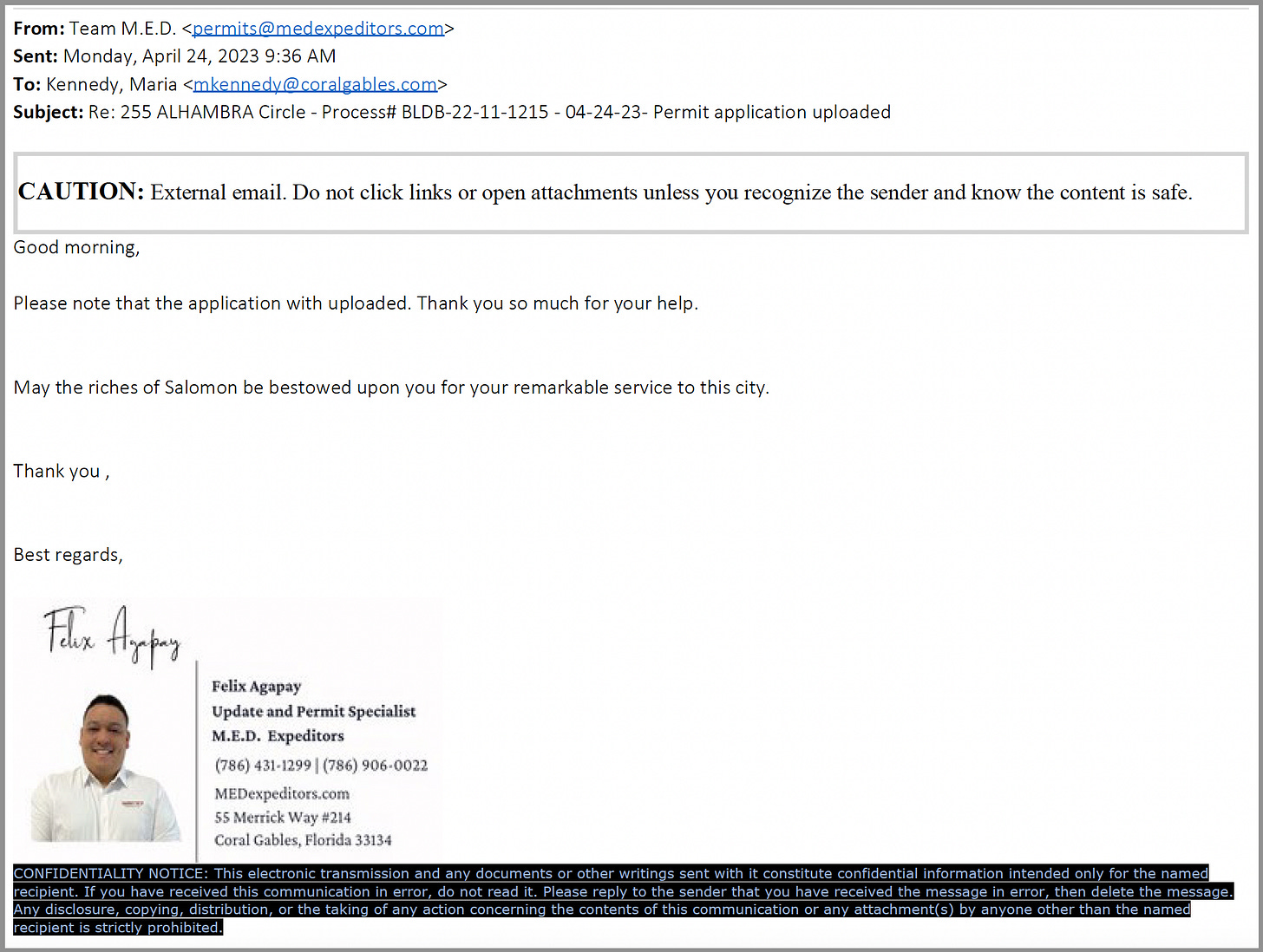
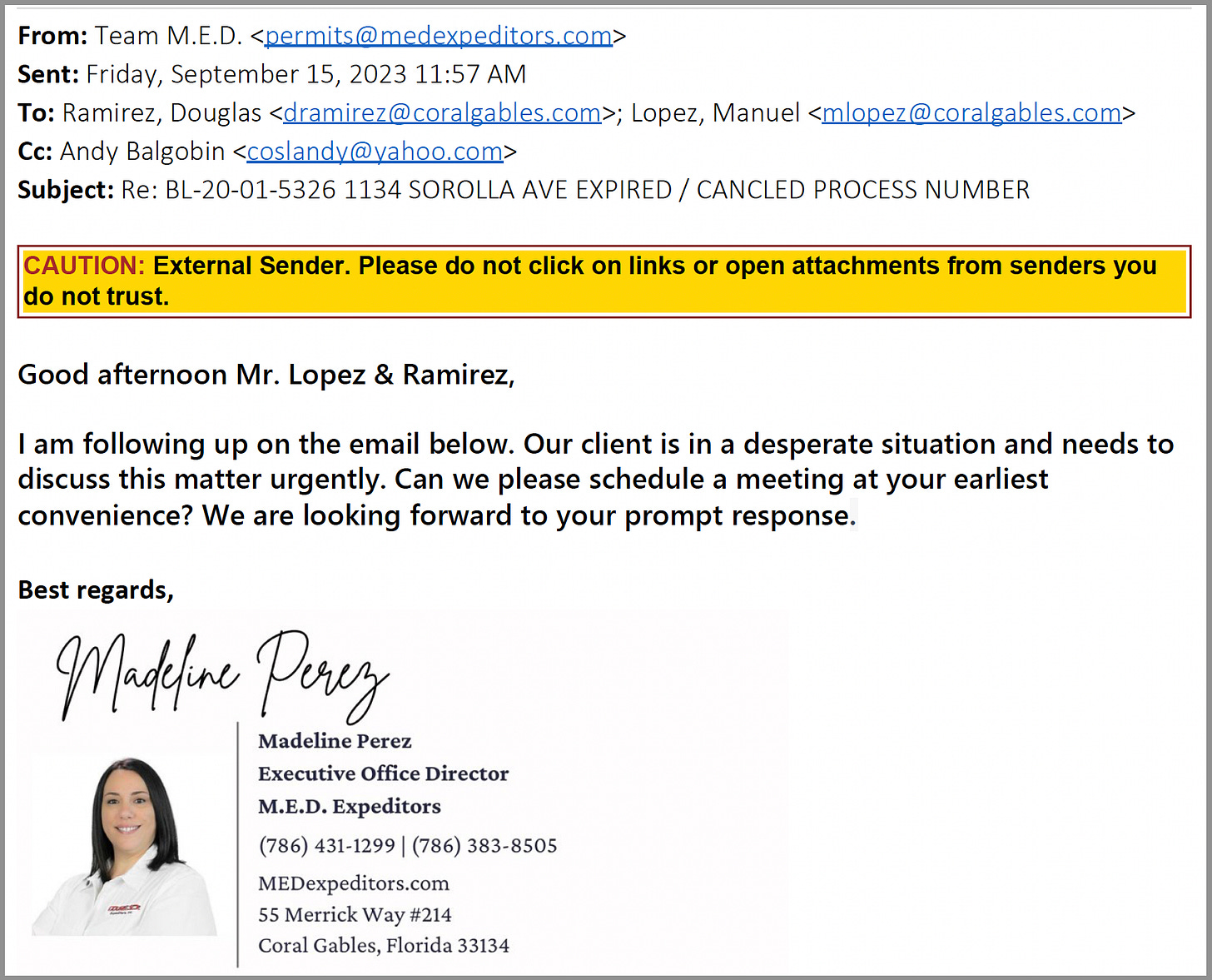
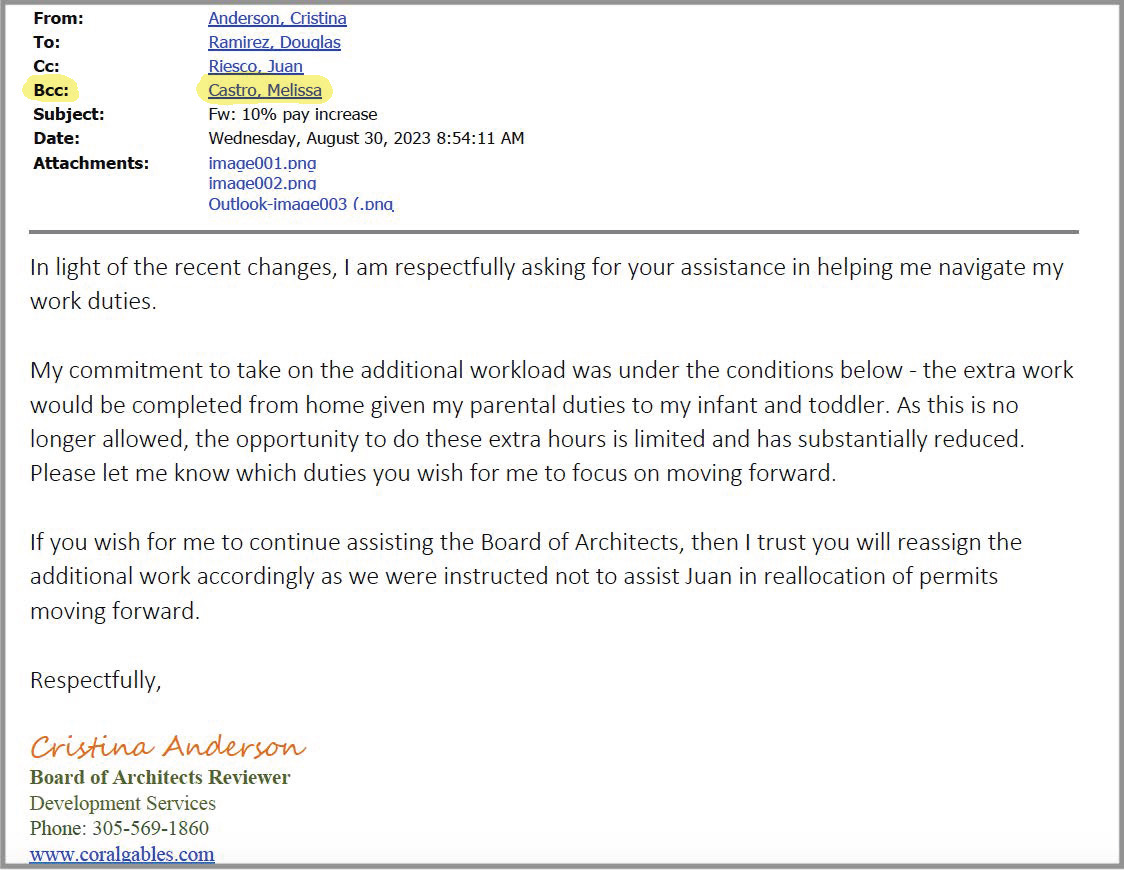
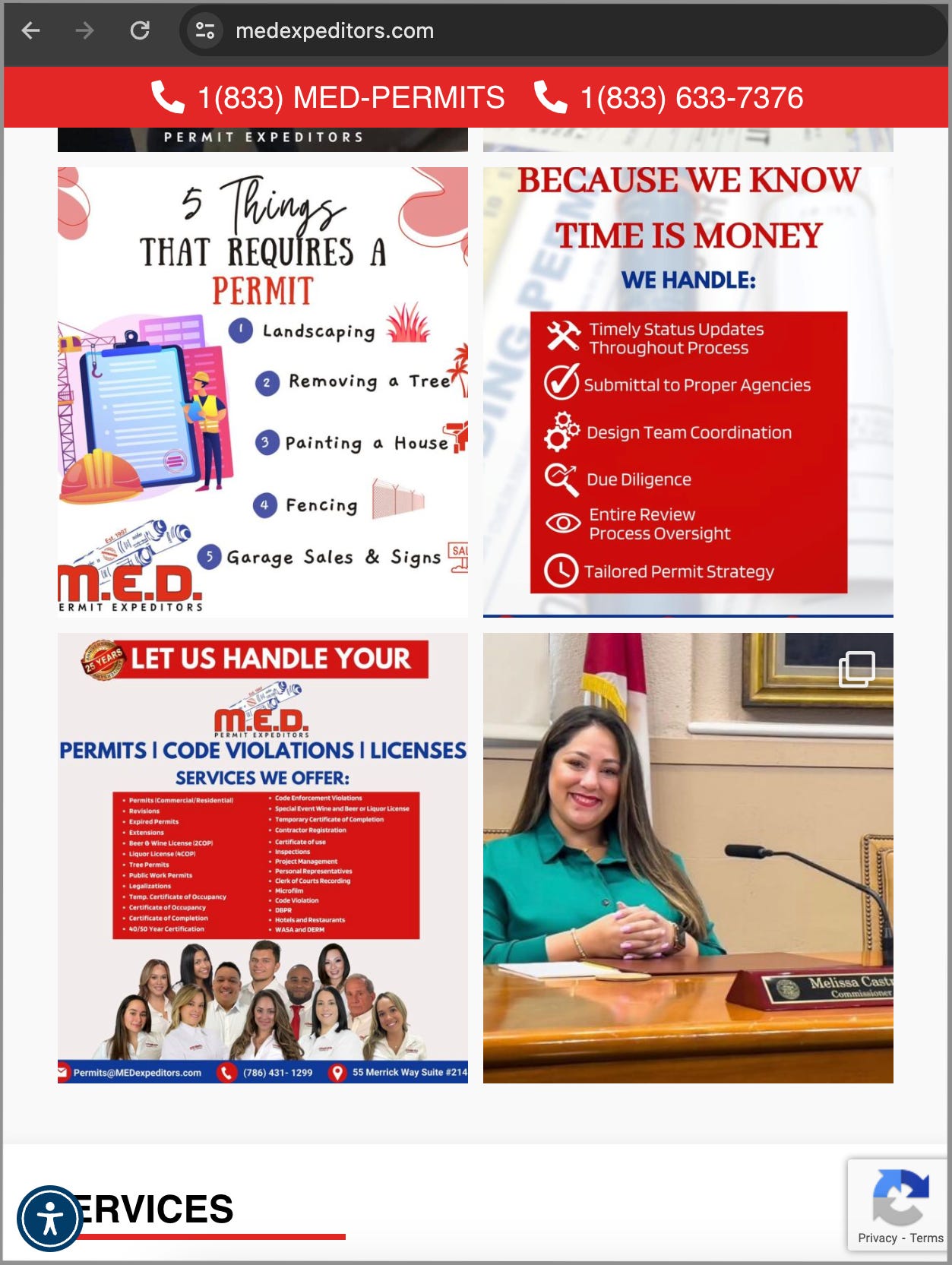
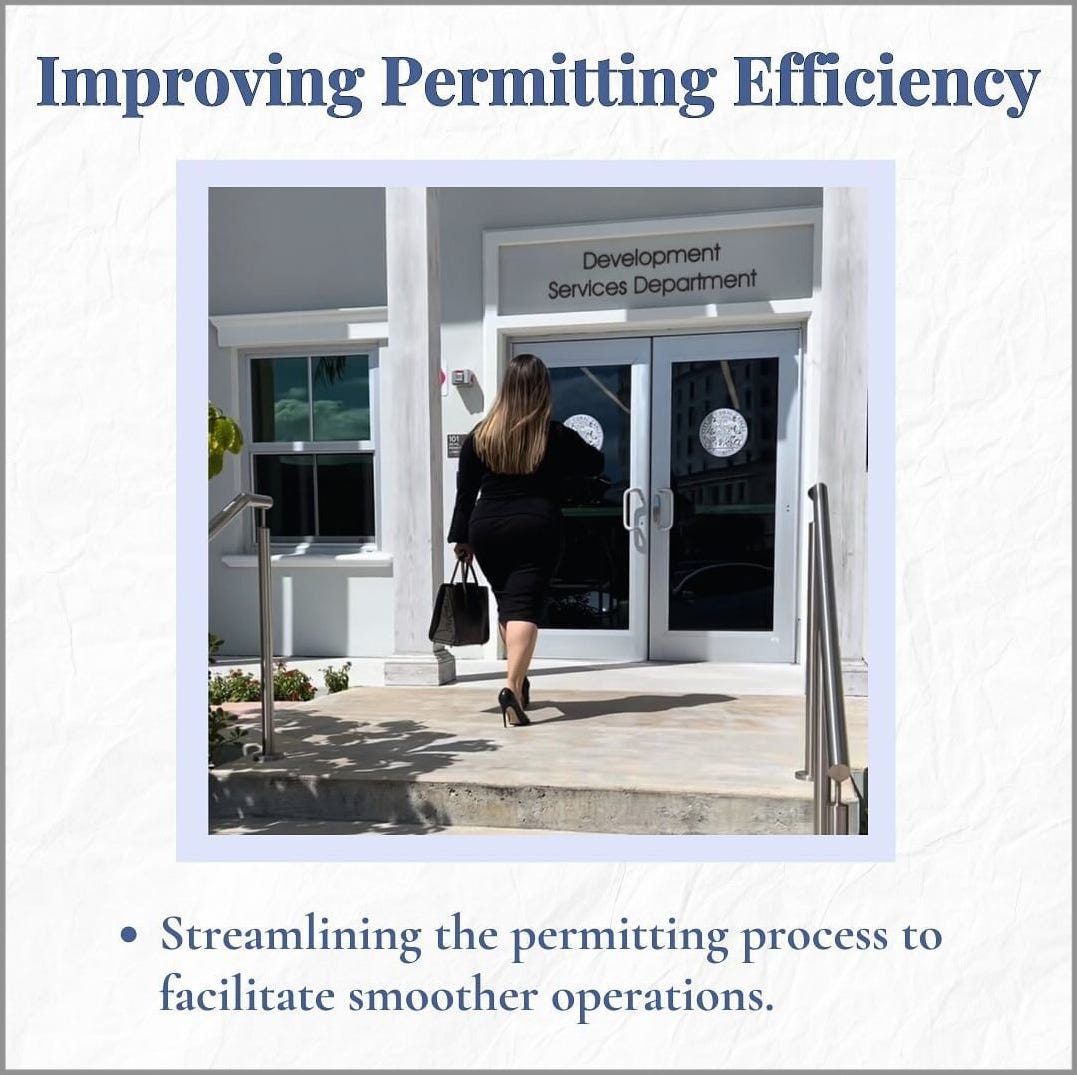
Aesop, some would say that Commissioner Castro and her proxies are just taking advantage of the wiggle room that the COE's opinion has provided. As I see it, the line between the ministerial and advocacy realms here can be a bit blurry and the Commissioner does appear to be trying to transact in that convenient blurriness. Whether she is succeeding at that remains to be seen. What is certain, and I am surprised this hasn't been brought up before, is that MED enjoys a clear competitive advantage over other permit expediters that ply their trade in the city. That's why the image of the Commissioner, sitting on the dais behind her Commissioner's nameplate, occupies prominent real estate on the MED website. This is unfair to other expediting firms competing for work on projects in Coral Gables. I submit that this is not only unfair, but also unethical. If I were a competitor, I would make this an issue.
Grossly mishandled by COE. Additionally I agree 100% with Mr Paul A. The photo of Commissioner Castro sitting on the Dais for her MED Expeditors advertisement is further proof of a failed system where one walks away with slap on the wrist. This should not be allowed. MED Expeditors is not the only permitting company in town and the monopoly of it all is pretty sickening. And why are City employees copying Ms Castro on an email regarding a 10% raise? Seems she’s got her tentacles wrapped around lots of folks there. Keep digging Aesops, this is only the beginning.